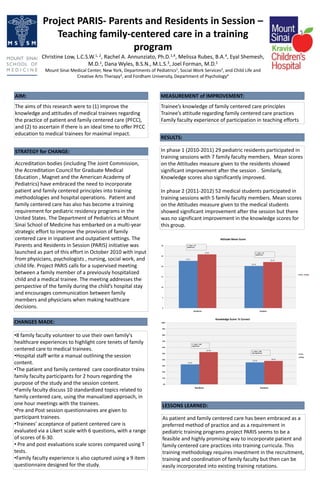Ihi storyboard 9 21-12
- 1. Project PARIS- Parents and Residents in Session – Teaching family-centered care in a training program Christine Low, L.C.S.W. 1, 2, Rachel A. Annunziato, Ph.D. 1,4, Melissa Rubes, B.A. 4, Eyal Shemesh, M.D.1, Dana Wyles, B.S.N., M.L.S.3, Joel Forman, M.D.1 Mount Sinai Medical Center, New York, Departments of Pediatrics1, Social Work Services2, and Child Life and Creative Arts Therapy3, and Fordham University, Department of Psychology4 AIM: MEASUREMENT of IMPROVEMENT: The aims of this research were to (1) improve the Trainee’s knowledge of family centered care principles knowledge and attitudes of medical trainees regarding Trainee’s attitude regarding family centered care practices the practice of patient and family centered care (PFCC), Family faculty experience of participation in teaching efforts and (2) to ascertain if there is an ideal time to offer PFCC education to medical trainees for maximal impact. RESULTS: STRATEGY for CHANGE: In phase 1 (2010-2011) 29 pediatric residents participated in training sessions with 7 family faculty members. Mean scores Accreditation bodies (including The Joint Commission, on the Attitudes measure given to the residents showed the Accreditation Council for Graduate Medical significant improvement after the session . Similarly, Education , Magnet and the American Academy of Knowledge scores also significantly improved. Pediatrics) have embraced the need to incorporate patient and family centered principles into training In phase 2 (2011-2012) 52 medical students participated in methodologies and hospital operations. Patient and training sessions with 5 family faculty members. Mean scores family centered care has also has become a training on the Attitudes measure given to the medical students requirement for pediatric residency programs in the showed significant improvement after the session but there United States. The Department of Pediatrics at Mount was no significant improvement in the knowledge scores for Sinai School of Medicine has embarked on a multi-year this group. strategic effort to improve the provision of family centered care in inpatient and outpatient settings. The Attitude Mean Score Parents and Residents in Session (PARIS) initiative was 30 P - Value < .01 (Significant) launched as part of this effort in October 2010 with input 25.84 P - Value < .01 (Significant) 25 from physicians, psychologists , nursing, social work, and 22.71 22.15 child life. Project PARIS calls for a supervised meeting 20 20.26 between a family member of a previously hospitalized Pre Post 15 child and a medical trainee. The meeting addresses the perspective of the family during the child’s hospital stay 10 and encourages communication between family 5 members and physicians when making healthcare decisions. 0 Residents Students Knowledge Score: % Correct CHANGES MADE: 100% 90% •8 family faculty volunteer to use their own family's 80% healthcare experiences to highlight core tenets of family 70% P - Value = .026 (Significant) centered care to medical trainees. 60% 52.4% P - Value = .699 •Hospital staff write a manual outlining the session 50% (Not Significant) Pre Post 40% 38.1% content. 35.7% 32.5% 30% •The patient and family centered care coordinator trains 20% family faculty participants for 2 hours regarding the 10% purpose of the study and the session content. 0% •Family faculty discuss 10 standardized topics related to Residents Students family centered care, using the manualized approach, in one hour meetings with the trainees. LESSONS LEARNED: •Pre and Post session questionnaires are given to participant trainees. As patient and family centered care has been embraced as a •Trainees’ acceptance of patient centered care is preferred method of practice and as a requirement in evaluated via a Likert scale with 6 questions, with a range pediatric training programs project PARIS seems to be a of scores of 6-30. feasible and highly promising way to incorporate patient and • Pre and post evaluations scale scores compared using T family centered care practices into training curricula. This tests. training methodology requires investment in the recruitment, •Family faculty experience is also captured using a 9 item training and coordination of family faculty but then can be questionnaire designed for the study. easily incorporated into existing training rotations.
